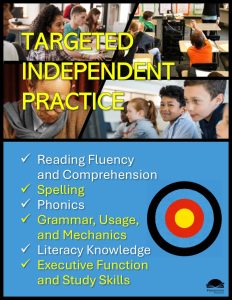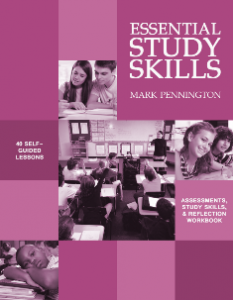Targeted Independent Practice | Executive Function and Study Skills
Perhaps no other educational practice cries out for mastery of executive function and study skills more so than independent work. How can we provide meaningful, independent practice for students without constant teacher supervision?
The 56 executive function and study skills in Targeted Independent Practice | Executive Function and Study Skills lessons will help your students learn what every student should know via independent practice. The easy-to-follow lesson format of 1. Personal Assessment 2. Study Skill Tips and 3. Reflection is ideal for self-guided learning. No prep. Minimal correction. Maximum assessment-based learning. Easy classroom management. Perfect for independent work during small groups, ideal for sub plans, a quick go-to for rainy days, nothing better for early finishers.
Table of Contents
Motivation
- How to Get Motivated
2. How to Prevent Procrastination
3. How to Set Goals
4. How to Develop a Positive Mental Attitude
Organization and Time Management
- How to Create a Home Study Environment
6. How to Get Organized for Homework
7. How to Complete a Daily Review
8. How to Manage Time for Homework
Reading Strategies and Skills
- How to Choose Books for Independent Reading
10. How to Develop Good Reading Habits
11. How to Improve Oral Reading Fluency
12. How to Improve Silent Reading Fluency
13. How to Read Interactively
14. How to Improve Reading Comprehension
15. How to Make Inferences
16. How to Use Marginal Annotations
17. How to Read Non–Fiction Textbooks
18. How to Identify the Main Idea
19. How to Complete a Close Reading for Narrative Text
20. How to Complete a Close Reading for Expository Text
21. How to Use Context Clues
Research
- How to Quote and Cite Textual Evidence
23. How to Identify Bias and Errors in Reasoning
24. How to Research Safely and Evaluate Internet Sources
Memorization Strategies
- How to Memorize with the Grouping Strategy
26. How to Memorize with the Association Strategy
27. How to Memorize with the Linking Strategy
28. How to Memorize with the Catch Words Strategy
29. How to Memorize with the Catch Sentence Strategy
30. How to Memorize with the Location Strategy
Essay Writing
- How to Dissect a Writing Prompt
32. How to Write a Thesis Statement
33. How to Avoid Errors in Writing Style
34. How to Follow Essay Writing Rules
35. How to Write an Essay Introduction
36. How to Write Essay Body Paragraphs
37. How to Write an Essay Conclusion
38. How to Write in Complex Sentences
Listening and Note–taking
- How to Practice Active Listening
40. How to Take Notes
41. How to Organize Cornell Notes
42. How to Organize Formal Outline Notes
Grammar, Spelling, and Mechanics Study Skills
- How to Identify and Use the Parts of Speech
44. How to Use Grammatical Sentence Openers for Sentence Variety
45. How to Use Precise Verb Tenses
46. How to Eliminate the “to be” Verbs
47. How to Spell by the Rules
48. How to Apply the Syllable Rules
49. How to Punctuate Properly
50. How to Capitalize Correctly
51. How to Avoid Non-Standard Usage
Test Preparation and Test–taking
- How to Prepare for Tests
53. How to Use Objective Test–taking Strategies
54. How to Use Matching Test–taking Strategies
55. How to Use Fill–in–the–Blank Test–taking Strategies
56. How to Use Multiple Choice Test–taking Strategies
Diagnostic Self-Assessment and Mastery Matrix
Executive Function and Study Skills are particularly well-suited to diagnostic differentiation and independent practice. Not all students need practice on collective nouns or capitalization of titles. Some do; but some don’t. Targeted worksheets with formative assessments make sense. Why not take a look at the full affordable program to see if this is what you need to get max results in your classes. Grades 4 on up.

Targeted Independent Practice
My Targeted Independent Practice series supports teachers with quality assessment-based independent learning. Each program includes 1. A comprehensive diagnostic assessment to determine student needs 2. Targeted worksheets corresponding to the specific diagnostic test components 3. Formative assessments to determine mastery. View each program in its entirety.
*** Reading Fluency and Comprehension
*** Grammar, Usage, and Mechanics
*** Executive Function and Study Skills
Not sure if your students need interventions? Download the free Targeted Independent Practice Diagnostic Assessments and let the data inform your instructional decision-making.
